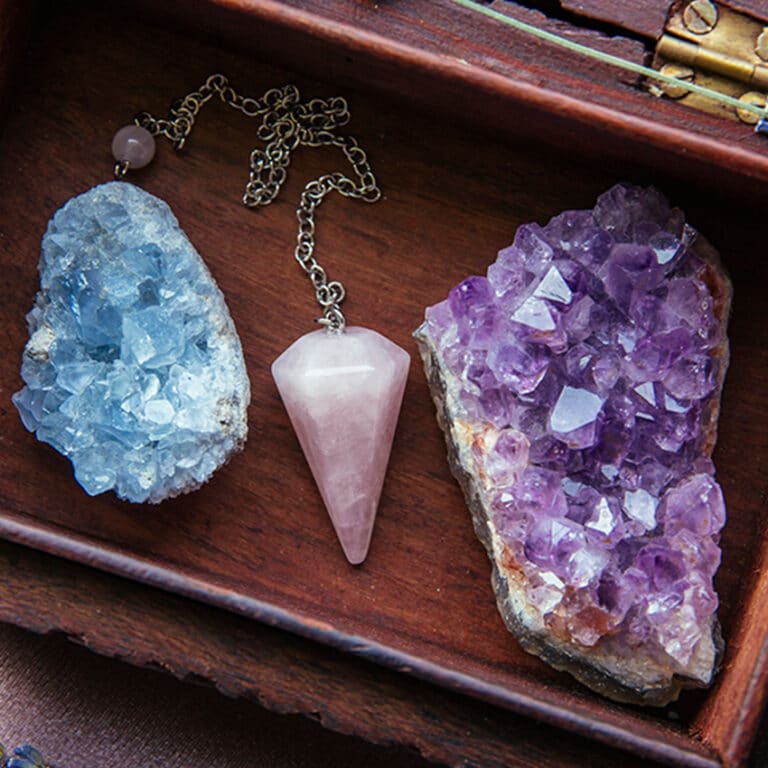Tarot has taken the world by storm, and it’s not unlikely that you are already well-acquainted with this magical divination tool. But it’s also not the only form of divination out there — and if you’re not looking closely, you may just be missing out on some powerful divinatory systems!
It’s not a secret that many divination systems are shrouded in some veil of mystery and mystique, even if they have become more of an occult staple like Tarot cards.
Whether or not you are satisfied with just working with astrology or have found something amiss about the esoteric wisdom you have stumbled upon thus far, reading up on some divination systems outside of what you know can be truly enlightening. Branching outside of what we know to seek alternative answers or systems is one of the reasons divination exists in the first place, so digging a bit deeper to explore other systems is ideal no matter what!
Today, we aim to unveil a bit of the magic behind divination and let you in on some “new” divination systems that you may love.
5 Underrated & Powerful Divination Systems
1. Scrying
Mirror, mirror on the wall… who is the easiest divination system to access of them all? (Hint: it’s scrying!).
Scrying is achieved by tuning in with your inner eye and vision, and decoding whatever comes to mind in order to relay a message. Like Tarot, this is a divination method that often relies on you intuiting symbols and images, but unlike Tarot, the symbols and images are seen in your mind’s eye. Often, a reflective surface is used to gaze into and focus upon, but at the end of the day the visions, symbols, and concepts come from within.
Chances are, you have seen depictions of scrying across multiple forms of media, like in TV or the movies. Psychics are often depicted staring into a crystal ball and foreseeing the future — this is what scrying is!
However, you don’t need a crystal ball in order to successfully scry. Tools can range from a bowl of water, a mirror, smoke, or oil — any reflective surface works!
2. Tasseography

Also more commonly known as a tea leaf reading, tasseography is a divination system that calls for a cup, hot water, some loose leaf tea, and your intuition!
Practicing tasseography can be both fun and as simple or as complicated as you wish.
Brew up the tea, focus on a question, and allow the querent to sip the tea until only the tea leaves are left. Some may add steps here, including rotating the cup, or stirring the tea a certain amount of times, as an example. Like all other forms of divination, there are many ways to go about it, and you should ultimately do what feels right for you.
After the tea leaves are set and ready to be read, you will begin to make out symbols, images, or concepts that you can see in the shape of the leaves. Often, they will look like animals, numbers, letters, or miscellaneous objects. Similar to scrying, this is a form of divination that will require you to think intuitively about what messages are being relayed in these (sometimes abstract) symbols.
Overall, if you already are a tea lover yourself, or enjoy extremely interactive forms of divination, tasseography may be a match made in heaven.
3. Runes
Runes are very similar to the Tarot in that they are visual tools with a specific set of meanings assigned to different pieces.
Instead of cards, however, the symbols of this divination tool are put on a series of stones. One other difference is that the Tarot cards are 78 in total, while runes are usually only about 24. Just like the Tarot, however, you draw stones when seeking your answers.
The symbol on the stone you draw will reveal the answers that you seek. You can also do readings with Runes, and draw three or five or even 10 if you want detailed answers! Runes are a very powerful divination tool that have been used for thousands of years for everyone from mystics to witches to famous philosophers to get detailed answers to some of life’s biggest secrets!
Learn more about rune stones by reading: The Ultimate Guide to Rune Stones
4. Pendulums

Sometimes, the simplest answers are the best. As much as astrology or Tarot answers many of our general questions, sometimes we just need a yes or no answer. Should I take this job offer? Should I answer this phone call? Do I go to this party?
These are questions that won’t always require a full-blown Tarot spread, but we may still need some extra guidance on it. This divination tool is so simple, and it does just that.
Ask a pendulum your question, and wait to see which way the pendulum swings! If you have your own pendulum, you simply need to calibrate it so that you know what answer means no, and what answer means yes. For example, you can do this by asking the pendulum if your name is… whatever your name is.
Watch which way it swings for your known Yes answer, and you’ve just calibrated your pendulum. Whenever you need a quick fix and quick answers that more complex forms of divination can’t provide right away, the pendulum is your go-to!
5. Lenormand Cards
If you love Tarot, chances are you’ll love Lenormand cards, especially if you’re looking for something a little more focused on specificity or future-based readings.
Like Tarot, Lenormand is a card-based divination system that has specific meanings and definitions assigned to each card. However, whereas Tarot often shows us how and why things are happening, Lenormand is significantly more focused on the “what.”
This means that if you’re interested in more “fortune-telling” based forms of divination, then Lenormand may just be an ideal choice.
This option is particularly great for card readers looking to branch outside of their comfort zone, or are looking to expand their deck inventory to a more diverse state that can accommodate many different kinds of questions and readings!
Which Divination System Will You Choose?
These are just five divination systems among many others, some that have grown to be as popular and more mainstream like Tarot, and some that have been lost in the sands of time as centuries have passed.
Learning and growing with your intuition can be a little more fun with tried and true divination methods and systems at your disposal no matter what, so don’t be afraid to try something new every now and then.
Ultimately, it may take a lot of research and practice, as well as trial and error, to discover what divination systems do and don’t work for you — and that can be part of the fun too!

